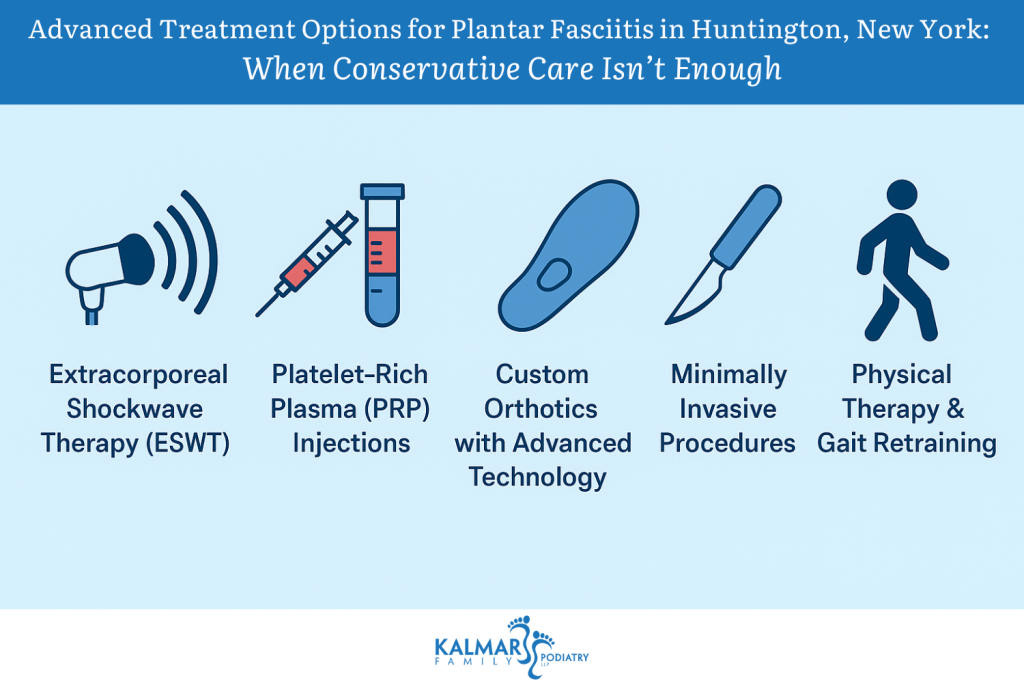
Plantar fasciitis is one of the most common causes of heel pain, affecting thousands of people in Huntington and across Long Island each year. The condition occurs when the thick band of tissue along the bottom of your foot (the plantar fascia) becomes inflamed or irritated.
For many patients, conservative care—such as rest, stretching exercises, supportive orthotics, and anti-inflammatory medications—can bring relief. However, for some, the pain persists and begins to interfere with work, daily activities, and overall quality of life.
At Kalmar Family Podiatry, we specialize in identifying the root cause of heel pain and offering advanced treatment options when the basics just aren’t enough. If you’ve tried everything but are still struggling, here are next-level therapies that may help you finally get back on your feet.
When to Consider Advanced Treatments
You may benefit from advanced therapies for plantar fasciitis if:
- Pain persists beyond 6–12 months of conservative care
- Morning heel pain makes walking unbearable
- Standard treatments such as rest, stretching, and shoe inserts provide little to no relief
- Heel pain limits your work, exercise, or daily activities
Advanced Treatment Options for Plantar Fasciitis
1. Extracorporeal Shockwave Therapy (ESWT)
This non-invasive procedure uses sound waves to stimulate healing in the plantar fascia. ESWT helps increase blood flow, reduce inflammation, and promote tissue repair—all without surgery.
2. Platelet-Rich Plasma (PRP) Injections
PRP therapy uses a small sample of your own blood, processed to concentrate healing platelets, which is then injected into the heel. This accelerates the body’s natural repair process and can be especially effective for chronic plantar fasciitis.
3. Custom Orthotics with Advanced Technology
While basic shoe inserts are helpful, custom orthotics are tailored to your unique foot structure and gait. At Kalmar Family Podiatry, we use cutting-edge technology to design orthotics that relieve stress on the plantar fascia long-term.
4. Minimally Invasive Procedures
For patients who don’t respond to other treatments, minimally invasive procedures—such as ultrasound-guided fasciotomy—can release tension in the fascia with less downtime than traditional surgery.
5. Physical Therapy & Gait Retraining
Sometimes, heel pain persists due to the way a person walks or stands. Partnering with physical therapists, we provide gait retraining and strengthening programs to correct biomechanical issues contributing to plantar fasciitis.
Frequently Asked Questions (Q&A)
Q: How do I know if my heel pain is plantar fasciitis?
A: The most common sign is sharp pain in the bottom of the heel, especially with your first steps in the morning. A podiatric exam and, if needed, imaging can confirm the diagnosis.
Q: How long should I try conservative treatments before moving on to advanced options?
A: Most patients improve within 6–12 months with conservative care. If your pain continues beyond that timeframe—or worsens—it’s time to explore advanced therapies.
Q: Is ESWT painful?
A: Some patients feel mild discomfort during treatment, but most tolerate it well. The procedure is non-surgical and requires little to no downtime.
Q: Are PRP injections safe?
A: Yes. Because PRP is derived from your own blood, the risk of allergic reaction or rejection is extremely low. It is considered a safe and natural regenerative treatment.
Q: Will I need surgery for plantar fasciitis?
A: Surgery is a last resort and only considered after other advanced treatments have failed. Fortunately, most patients improve significantly without needing surgery.
Q: Can orthotics alone fix plantar fasciitis?
A: Orthotics can be highly effective in reducing stress on the plantar fascia, but for chronic cases, they are often used in combination with other treatments.
Take the Next Step Toward Pain-Free Living
If you’re living with persistent heel pain and conservative care hasn’t worked, don’t give up. At Kalmar Family Podiatry, we provide personalized care plans that include the latest advanced treatments to help you heal and get back to your active lifestyle.
📍 Kalmar Family Podiatry
62 Green Street, Huntington, NY, 11743
📞 Phone: (631) 549-0955
🌐 kalmarfamilypodiatry.com
